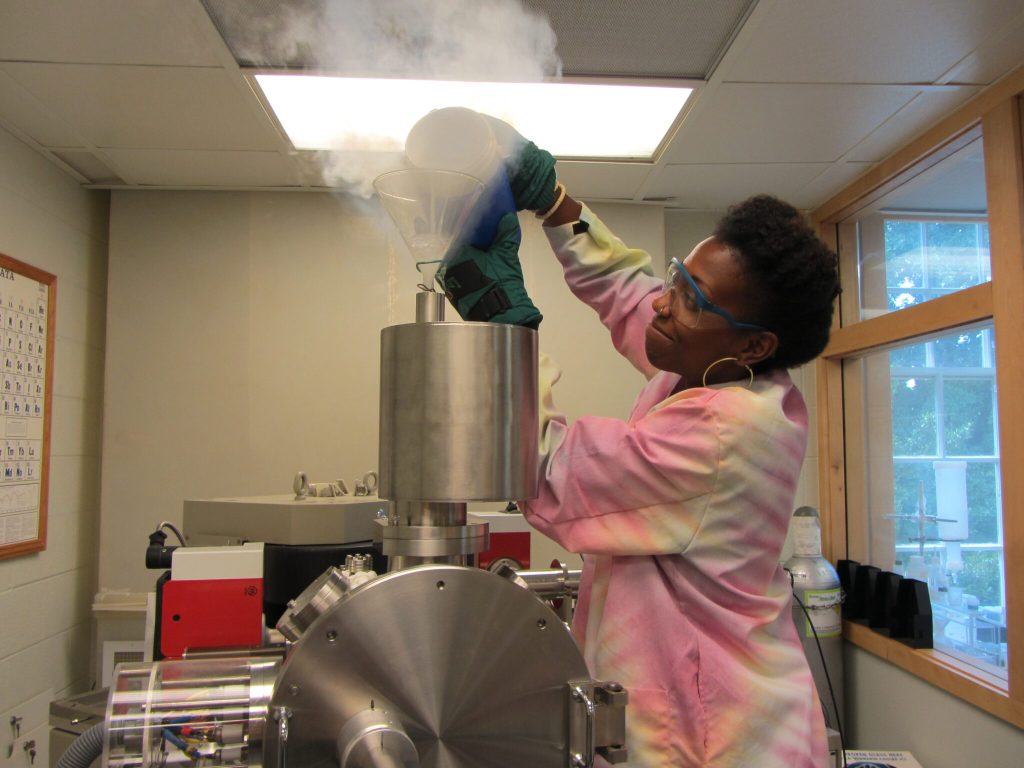IE, partners receive more than $500,000 to fund environmental health sciences internships
January 29, 2021
Starting in February 2021, a new collaborative initiative between the UNC Institute for the Environment, the Curriculum in Toxicology and Environmental Medicine in the UNC School of Medicine, and the Department of Biological and Biomedical Sciences at North Carolina Central University (NCCU), will provide research opportunities for diverse undergraduates through a new program called the 21st Century Environmental Health Scholars (21EH Scholars). This program will support up to 10 scholars annually from UNC and NCCU and is funded by a $516,000 grant from the National Institute for Environmental Health Sciences (NIEHS).
“In 21EH Scholars, we’re broadening access to environmental health sciences research by engaging students who have typically been underrepresented in STEM disciplines,” says Kathleen Gray, research associate professor in the Institute and one of three principal investigators for the program. “To solve our most pressing environmental problems, we need the enhanced creativity and productivity typically associated with diverse teams, and we expect this program to ultimately contribute to a more diverse environmental health sciences workforce.”
Ilona Jaspers, professor in the Department of Pediatrics in the School of Medicine and director of the Curriculum in Toxicology and Environmental Medicine and Antonio Baines, associate professor in the Department of Biological and Biomedical Sciences in the College of Health and Sciences at NCCU, are the other principal investigators. They have been working together for several years in training and mentoring students in toxicology and environmental medicine.
“Environmental contaminants have a disparate impact on the public health of disadvantaged communities,” says Jaspers. “One of the major goals of NIEHS’ Strategic Plan is to ensure environmental health equities. Obviously, this goal is much easier achieved if we can diversify the next generation of environmental health scientists.”
21EH Scholars internships will last one year, and students will work 10 hours weekly during the spring and fall semesters and 30 hours weekly during the summer. The program is designed to support students who are underrepresented in STEM fields, a group that includes women of any race or ethnicity and Black, Hispanic, American Indian, and Alaskan Native individuals.
“Unfortunately, studies show that communities of color disproportionally live in or near neighborhoods negatively impacted by air and water pollution,” Baines says. “The 21EH Scholars from both NCCU and UNC will be learning environmental health sciences together in the classroom and laboratory, making them advocates for cleaner communities.”
Carolina Student Transfer Excellence Program or C-STEP students, who have completed two years at a North Carolina community college and transferred to UNC, are also encouraged to apply, according to Megan Hoert Hughes, program coordinator for 21EH Scholars and STEM diversity program manager in the Institute’s Center for Public Engagement with Science.
“Transfer students often haven’t benefited from those first two formative years at UNC, so it’s often hard for them to work their way into a research lab,” Hughes says. “We want to make sure that those students are engaged in UNC’s environmental health research opportunities, so that’s why we’re reaching out to them specifically.”
21EH Scholars will provide invaluable opportunities to students and mentors, according to Hughes. “It’s an opportunity to get hands-on research experience and to have a high-quality mentorship experience because we know that mentoring makes a difference to being retained in the STEM fields,” Hughes says. “And participation will have graduate school and future career benefits because it grows students’ networks and helps them see different pathways they could follow.”
21EH Scholars builds on the Institute’s former Increasing Diversity and Enhancing Academia (IDEA) program, led by Gray and Hughes, which provided geoscience research internships for UNC and NCCU undergraduates over the past eight years.
Students who are selected rank their choices of participating in environmental health labs at UNC. Though initially designed as an in-person experience, due to the ongoing COVID-19 pandemic, the program will include labs that provide in-person and remote opportunities.
“Our hope is that the student really becomes part of a lab team and learns about what that means, how a research lab functions,” Hughes says. “They’ll also gain some in-depth knowledge about one or more environmental health topics.”
Antiracism training and continued support for mentors will also further the program’s efforts toward equity and inclusivity.
“We hope to facilitate conversation with mentors about issues such as, ‘What does it mean to be an antiracist lab? How can I make sure that is the kind of lab I’m running?,’” Hughes says. “I think many faculty members want to have diverse labs, but they don’t always know how to make that happen or may need some help in their own understanding of what white supremacy looks like at a Research I University or what an antiracist lab looks and feels like.”
Hughes also expects that the program will bring measurable value to the STEM field while combatting structural inequities.
“Many groups are underrepresented in the STEM fields, and it’s really important that we have scientists from diverse backgrounds,” Hughes says. “Our program is just one little brick, but there are other programs like this all over the country, all over the world, that are bringing more diversity into STEM. So together, I think that’s going to really change who the next generation of scientists are.”
“To get more talented students from diverse backgrounds to catch the ‘environmental health research bug,’ we need to first get them engaged in exciting research opportunities. The 21EH Scholars program will do that,” Jaspers adds.
Story by Ellie Heffernan
Ellie Heffernan is a junior at UNC majoring in journalism and environmental studies. During her time at UNC, she has written for The Daily Tar Heel, volunteered with Musical Empowerment as a teacher and leadership team member, and been a part of the Service and Leadership Residential Learning Program.
